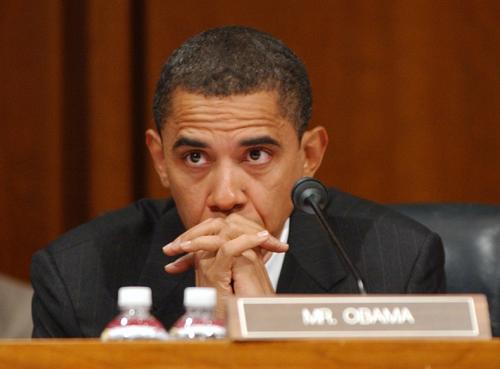Congress voices disapproval of Iraq strategy

Senate Foreign Relations Committee member Sen. Barack Obama, D-Ill. takes part in a debate on a Iraq War resolution, Wednesday, Jan. 24, 2007 on Capitol Hill in Washington. (AP Photo/Dennis Cook)
Jan 25, 2007
Last updated on May 12, 2016 at 07:17 a.m.
WASHINGTON – In a calculated snub of President Bush, the Democratic-controlled Senate Foreign Relations Committee dismissed plans for a troop buildup in Iraq on Wednesday as “not in the national interest” of the United States.
“The president has made his decision,” Vice President Dick Cheney fired back, a response that made it clear the administration would go ahead anyway. “We need to get the job done.”
The committee vote, 12-9 along party lines, capped hours of debate in which Republicans and Democrats vented their frustration and anger – both with the administration and their own past unwillingness to change the course of a war that has claimed the lives of more than 3,000 U.S. troops.
“There is no strategy. This is a ping-pong game with American lives,” said Republican Sen. Chuck Hagel of Nebraska.
Get The Daily Illini in your inbox!
“This Congress was never meant to be a rubber stamp,” added Sen. Barbara Boxer, D-Calif. “Read the Constitution. The Congress has the power to declare war. And on multiple occasions, we used our power to end conflicts.”
Hagel was the only one of 10 committee Republicans to support the nonbinding measure. Several of the panel’s 11 Democrats said they favored stronger legislation to register their opposition to the war.
In the wake of midterm election losses, Bush announced two weeks ago that he would order an additional 21,500 troops into the war zone. In Tuesday night’s State of the Union address, he implored skeptical lawmakers to give the strategy a chance.
Bush got his answer in less than 24 hours, the timing dictated by Democrats, and Sen. Joseph Biden. D-Del., the panel’s chairman, said tougher measures were likely to follow.
“Unless the president demonstrates very quickly that he is unlikely to continue down the road he’s on, this will be only the first step. … I will be introducing … constitutionally legitimate, binding pieces of legislation. We will bring them up,” he said.
Taken together, the committee’s vote and Cheney’s response suggested the Democrats and the White House were on a collision course, lawmakers drafting ever-stronger measures to change policy in Iraq, and the president exercising his prerogatives as commander in chief, and his veto pen.
“We are moving forward,” Cheney said in an interview with CNN in which he was asked about the troop buildup. “The Congress has control over the purse strings. They have the right, obviously, if they want, to cut off funding. But in terms of this effort, the president has made his decision.”
The vice president added: “We’ve consulted extensively with them. We’ll continue to consult with the Congress. But the fact of the matter is, we need to get the job done.”
Inside the Senate committee, all Republicans but Hagel opposed the measure, denying Democrats the strong bipartisan vote they had sought.
Biden, who has announced he intends to run for president in 2008, said the legislation is “not an attempt to embarrass the president. … It’s an attempt to save the president from making a significant mistake with regard to our policy in Iraq.”
Democrats intend to bring the measure to the Senate floor for a vote next week, and Biden said he is willing, in the interim, to make changes in the hopes of gaining additional Republican support.
Some committee Republicans sought unsuccessfully to temper the measure before it was approved. Additionally, more than a half-dozen GOP lawmakers in the Senate have signaled interest in an alternative that merely expresses disagreement with the president’s policy rather than deeming it not in the national interest.
“The thing that I’m deeply concerned about is putting American troops in the middle of this – the cross-hairs of this sectarian battle before the Iraqis” deliver on a series of promised reforms, said Sen. Norm Coleman, R-Minn.
Some of the most emotional rhetoric of the day came as committee members challenged one another to take a stand.
“If you wanted a safe job, go sell shoes,” said Hagel.
“This is a tough business,” he added. “But is it any tougher, us having to take a tough vote, express ourselves and have the courage to step up on what we’re asking our young men and women to do?”





